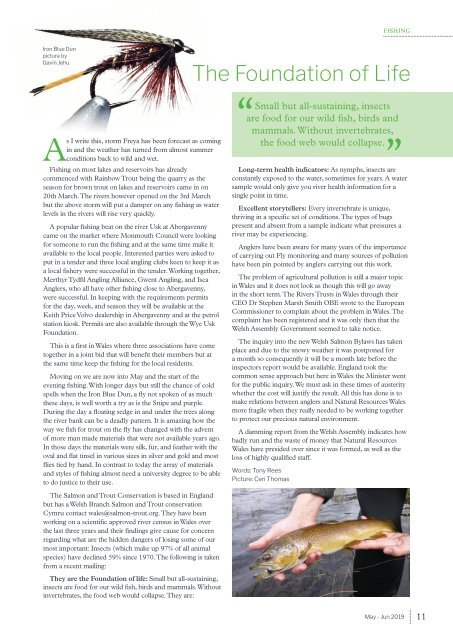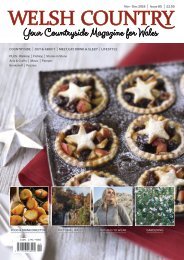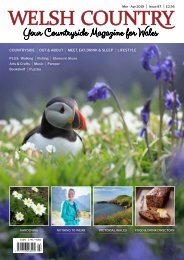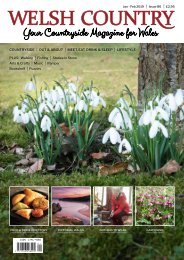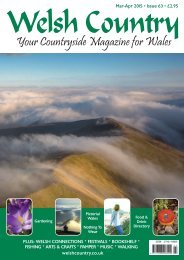Welsh Country - Issue88 - May - Jun 19
This is a complete issue of Welsh Country from May - Jun 19
This is a complete issue of Welsh Country from May - Jun 19
You also want an ePaper? Increase the reach of your titles
YUMPU automatically turns print PDFs into web optimized ePapers that Google loves.
FISHING<br />
Iron Blue Dun<br />
picture by<br />
Gavin Jehu<br />
As I write this, storm Freya has been forecast as coming<br />
in and the weather has turned from almost summer<br />
conditions back to wild and wet.<br />
Fishing on most lakes and reservoirs has already<br />
commenced with Rainbow Trout being the quarry as the<br />
season for brown trout on lakes and reservoirs came in on<br />
20th March. The rivers however opened on the 3rd March<br />
but the above storm will put a damper on any fishing as water<br />
levels in the rivers will rise very quickly.<br />
A popular fishing beat on the river Usk at Abergavenny<br />
came on the market where Monmouth Council were looking<br />
for someone to run the fishing and at the same time make it<br />
available to the local people. Interested parties were asked to<br />
put in a tender and three local angling clubs keen to keep it as<br />
a local fishery were successful in the tender. Working together,<br />
Merthyr Tydfil Angling Alliance, Gwent Angling, and Isca<br />
Anglers, who all have other fishing close to Abergavenny,<br />
were successful. In keeping with the requirements permits<br />
for the day, week, and season they will be available at the<br />
Keith Price Volvo dealership in Abergavenny and at the petrol<br />
station kiosk. Permits are also available through the Wye Usk<br />
Foundation.<br />
This is a first in Wales where three associations have come<br />
together in a joint bid that will benefit their members but at<br />
the same time keep the fishing for the local residents.<br />
Moving on we are now into <strong>May</strong> and the start of the<br />
evening fishing. With longer days but still the chance of cold<br />
spells when the Iron Blue Dun, a fly not spoken of as much<br />
these days, is well worth a try as is the Snipe and purple.<br />
During the day a floating sedge in and under the trees along<br />
the river bank can be a deadly pattern. It is amazing how the<br />
way we fish for trout on the fly has changed with the advent<br />
of more man made materials that were not available years ago.<br />
In those days the materials were silk, fur, and feather with the<br />
oval and flat tinsel in various sizes in silver and gold and most<br />
flies tied by hand. In contrast to today the array of materials<br />
and styles of fishing almost need a university degree to be able<br />
to do justice to their use.<br />
The Salmon and Trout Conservation is based in England<br />
but has a <strong>Welsh</strong> Branch Salmon and Trout conservation<br />
Cymru contact wales@salmon-trout.org. They have been<br />
working on a scientific approved river census in Wales over<br />
the last three years and their findings give cause for concern<br />
regarding what are the hidden dangers of losing some of our<br />
most important: Insects (which make up 97% of all animal<br />
species) have declined 59% since <strong>19</strong>70. The following is taken<br />
from a recent mailing:<br />
They are the Foundation of life: Small but all-sustaining,<br />
insects are food for our wild fish, birds and mammals. Without<br />
invertebrates, the food web would collapse. They are:<br />
The Foundation of Life<br />
“<br />
Small but all-sustaining, insects<br />
are food for our wild fish, birds and<br />
mammals. Without invertebrates,<br />
the<br />
food web would collapse.<br />
”<br />
Long-term health indicators: As nymphs, insects are<br />
constantly exposed to the water, sometimes for years. A water<br />
sample would only give you river health information for a<br />
single point in time.<br />
Excellent storytellers: Every invertebrate is unique,<br />
thriving in a specific set of conditions. The types of bugs<br />
present and absent from a sample indicate what pressures a<br />
river may be experiencing.<br />
Anglers have been aware for many years of the importance<br />
of carrying out Fly monitoring and many sources of pollution<br />
have been pin pointed by anglers carrying out this work.<br />
The problem of agricultural pollution is still a major topic<br />
in Wales and it does not look as though this will go away<br />
in the short term. The Rivers Trusts in Wales through their<br />
CEO Dr Stephen Marsh Smith OBE wrote to the European<br />
Commissioner to complain about the problem in Wales. The<br />
complaint has been registered and it was only then that the<br />
<strong>Welsh</strong> Assembly Government seemed to take notice.<br />
The inquiry into the new <strong>Welsh</strong> Salmon Bylaws has taken<br />
place and due to the snowy weather it was postponed for<br />
a month so consequently it will be a month late before the<br />
inspectors report would be available. England took the<br />
common sense approach but here in Wales the Minister went<br />
for the public inquiry. We must ask in these times of austerity<br />
whether the cost will justify the result. All this has done is to<br />
make relations between anglers and Natural Resources Wales<br />
more fragile when they really needed to be working together<br />
to protect our precious natural environment.<br />
A damming report from the <strong>Welsh</strong> Assembly indicates how<br />
badly run and the waste of money that Natural Resources<br />
Wales have presided over since it was formed, as well as the<br />
loss of highly qualified staff.<br />
Words: Tony Rees<br />
Picture: Ceri Thomas<br />
<strong>May</strong> - <strong>Jun</strong> 20<strong>19</strong> 11


